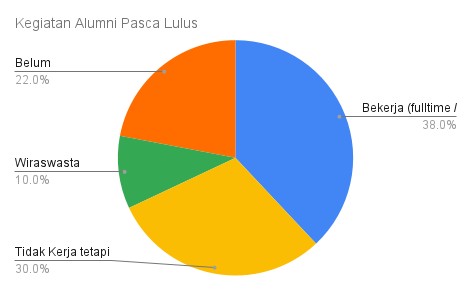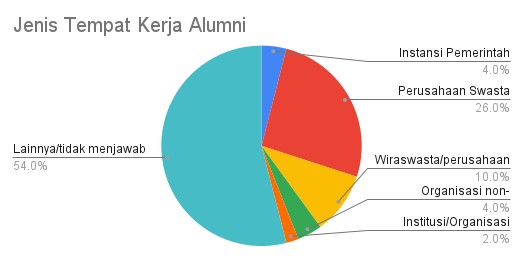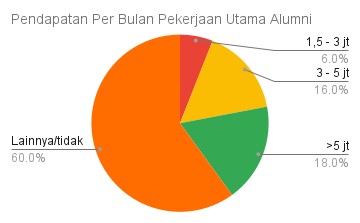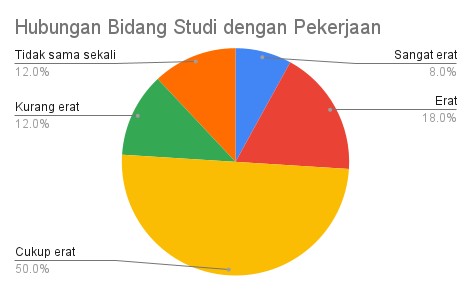Tracer Studies
UB conducts a tracer study which is conducted annually through this link tracer study questionnaire is intended for stakeholders (alumni and graduate users). The tracer study questionnaire consists of the following questions: the waiting period for graduates to get a job, the field of work of graduates, the qualifications required by graduate users in the world of work from each study program. Tracer studies aimed at alumni users are related to the proposed qualifications of graduates demanded by the world of work. This input is used as a suggestion for improving the study program curriculum. Curriculum evaluation is carried out every four years. Information regarding the quality assurance results of the GPA is conveyed to stakeholders through a meeting between the Study Program and stakeholders held before the evaluation of the Study Program curriculum.
Analysis Tracer Study Anthropology Study Program Alumni 2022-2023
This analysis was made to see the development of alumni from the Anthropology Study Program. The data analyzed is data from alumni who graduated in 2022 and 2023. In the previous AIM cycle, an analysis was carried out for alumni who graduated in these years, but currently there is an update of the data because there are additional alumni who fill out the tracer study.
Alumni Activities After Graduation

There is a question regarding alumni activities after graduation. In relation to this question, alumni were given answer options including "working" (full time/part time), "continuing education" (or continuing studies), "not working but looking for work, "self-employed", and not yet possible to work" (married/military obligation). From several options, 38% of alumni have worked either full time or part time, 30% of alumni have not worked and are looking for work, 10% of alumni are self-employed, and 22% of alumni are not working. In this period there were no alumni who continued their education to a higher level, the reason was because they were still waiting for the registration period.
Types and Categories of Alumni Workplaces

Alumni Program Studi Antropologi tahun 2022-2023 bekerja di berbagai instansi. Dari hasil pengisian tracer study ditemukan 4% alumni bekerja di instansi pemerintah (termasuk BUMN), 26% alumni bekerja di perusahaan swasta, 10% alumni berwirausaha, 4% alumni bekerja di organisasi non profit, dan 2% alumni bekerja di institusi/organisasi multilateral. Selain itu sebanyak 54% alumni memilih “lainnya” atau tidak menjawab. Beragamnya jenis tempat kerja alumni menunjukan bahwa alumni program studi Antropologi dapat diterima di berbagai sektor pekerjaan, terutama di sektor swasta.
Alumni's Income

The income of anthropology alumni who have worked is in the range of Rp 3,000,000 - Rp 5,000,000, there are no alumni who get salaries below the minimum wage. Of the 20 alumni who answered, 6% of alumni have a monthly income of Rp 1,500,000-3,000,000, 16% of alumni have a monthly income of Rp 3,000,000-5,000,000, and 18% of alumni have a monthly income of more than Rp 5,000,000. In addition, 60% of alumni chose "other" or did not answer.
Field of Study and Occupational Relationships

The aspect of the relationship between the field of study and work is also seen to review the relevance of the field of study in the world of work. This question was reviewed based on 5 answer options including: "Very Tight", "Tight", "Fairly Tight", "Not Tight", and "Not at All". 8% of alumni answered "Very Strongly", 18% of alumni answered "Strongly", 50% of alumni answered "Fairly Strongly", 12% of alumni answered "Less Strongly", and 12% of alumni answered "Not at All". From the proportion, it can be seen that there is a relevance of the field of study in the alumni's workplace. It can be seen from the many options, 50% of alumni mostly answered "Quite Tight", followed by the second most answers as many as 18% of alumni answered "Tight". Of course, these answers can be used as evaluation material for the Anthropology Study Program in developing curriculum and course materials to make them more relevant to the potential job market.

